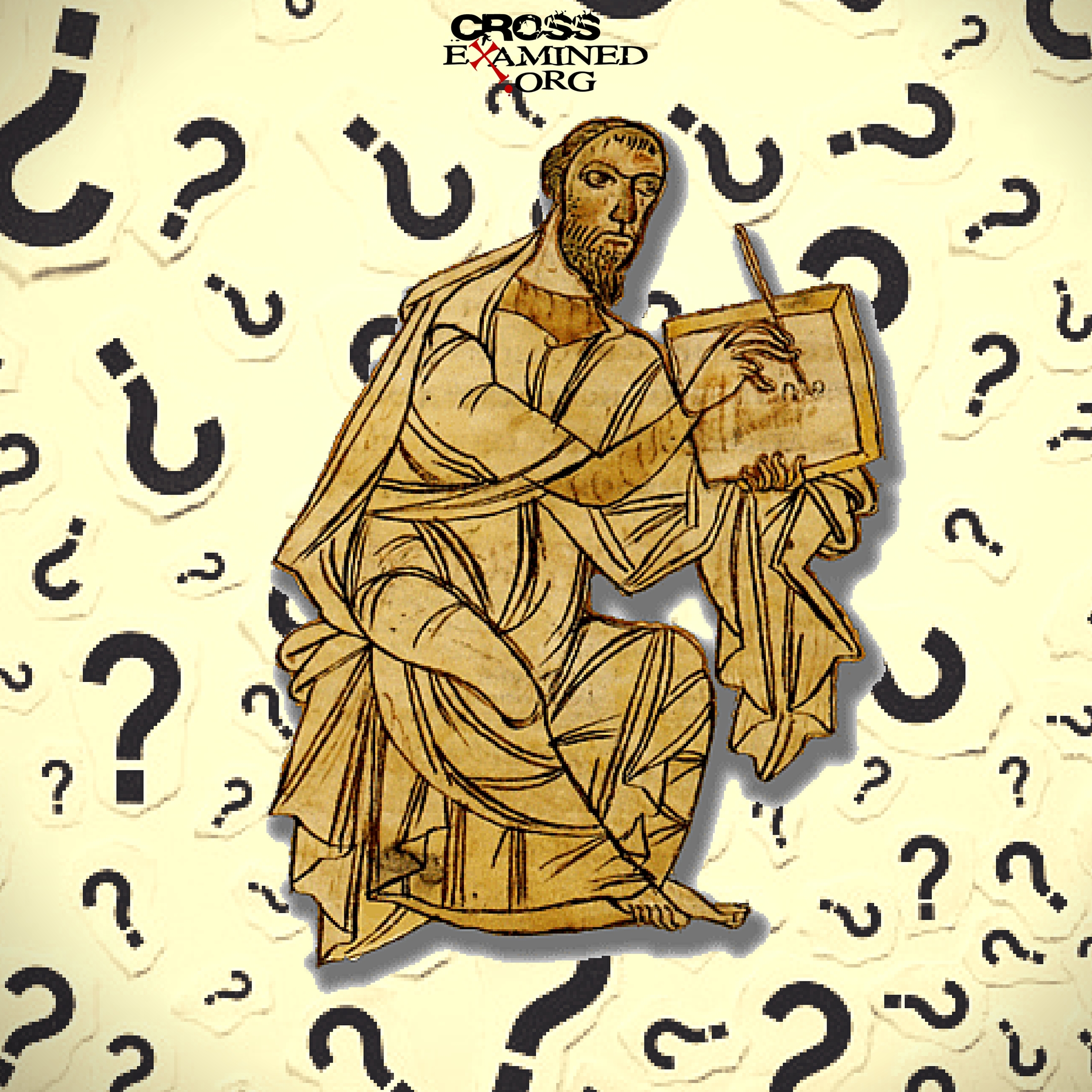The writer of Ecclesiastes instructs his students “…of making many books there is no end.” (Eccl. 12:2) and this is certainly true. A similar thing could certainly be said in responding to the continual flow of misinformation and outright falsehoods about Christianity from popular books, media and television documentaries. This is the second blog-article I am writing in response to the History Channel’s recent documentary “Mankind: The Story of All of Us” which I had the opportunity to appear as a guest speaker. In Episode 3 titled “Empires” the producers present the advent of Christianity as essentially the invention of the Apostle Paul and the result of an historical stroke of luck in which early Christians used Roman infrastructure (cities, roads, etc..) to spread the Christian message.
To be fair, not everything in the episode was wrong or misleading. There were, however, several statements made by the commentators which need to be answered. First, were statements by Muslim writer Reza Aslan (prominently featured in the episode about the early Church) about Paul and early Christianity. Reza made statements that are flatly incorrect. The first statement he makes is that the Apostle Paul is “…the man who fundamentally defines, invents even, what we now call Christianity” (emphasis mine). Aslan further states “For Christianity in the Jerusalem church, Christianity is Judaism. For them, to become a follower of Jesus, you must be a Jew. Paul has a completely different view. He argues that Jesus obliterates the Law of Moses” (emphasis mine). Secondly, were statements made by historian Henry Lewis Gates Jr. that are somewhat misleading. He stated that Christianity was, “…a religion for the dispossessed, for the extremely poor, for the slaves, and for many women. Basically anyone who didn’t have a voice in Roman society could find a voice in the Christian movement.”
Paul of Tarsus and the Early Christian Message
To say that Paul of Tarsus is an important figure in the Early Church is no understatement. Without him two-thirds of the New Testament would not be there. Perhaps it is for this reason that so many people believe that the Christian message is essentially his invention. But, was the Christian message Paul’s invention or was he merely proclaiming the same message Jesus’ disciples first preached? Furthermore, did Paul preach and exhort the obliteration of the Law of Moses rather than its fulfillment and completion in the person of Christ? To answer these questions we must first note Paul’s background and conversion experience.
Before he was Paul, his name was Saul whose Jewish family settled in Tarsus the principle city of Cilicia in Asia Minor (a Roman provence). When he was of the proper age, his parents sent him to Jerusalem to learn the Torah under the famous tutelage of Gamaliel, who according to New Testament historian, F.F. Bruce, “…was the most distinguished disciple of Hillel, and succeeded him as head of the school which bore his name.”[1] In his Epistle to the Philippians (3:5) Paul described himself as “…a Hebrew among Hebrews.” As he advanced he eventually became a Pharisee. Reflecting back on that time, he writes of himself, “I advanced in Judaism beyond many of my own age among my people, so extremely zealous was I for the traditions of my fathers (Gal. 1:14).” No one could doubt Paul’s Jewish credentials or training. But as Henry Chadwick points out, “Judaism was not monolithic. There were differences between the Pharisees and Sadducees that could become sharp.”[2] Which raises the question as to which version of Judaism was Paul repudiating when he preached the Gospel of Jesus?
When Paul went through his conversion experience (recorded in Acts 9), he certainly understood the implications for his Jewish tradition and specifically for Judaism as it had been interpreted (or rather misinterpreted) by the Jewish leaders in Jerusalem. From the very beginning of his ministry Paul proclaimed the message that Jesus was the Son of God; that He was risen from the dead and that He was the promised Messiah of the Old Testament, fulfilling the Law of Moses rather than contradicting it, to the Jews specifically in synagogues (Acts 9:19-22). Bruce believes that after the risen Christ had appeared to Paul on the Damascus road, the man who went from persecuting Christians to becoming a Christian convert himself, probably reasoned this way:
The disciples had been right after all: the ‘hanged man’ had indeed risen from the dead, and must consequently be acknowledged as Lord and Messiah. The pronouncement of the divine curse on the hanged man still stood in the Law; it must therefore be accepted that the Messiah incurred this curse, but now this paradox had to be considered and explained. Sooner rather than later, Paul saw the solution to the problem in the argument which he expounds in Gal. 3:10-14, where he says that Christ, in accepting death by crucifixion, voluntarily submitted to the divine curse which the law pronounces on all who break it (Deut. 27:26) by ‘becoming a curse’ on their behalf.[3]
So Paul’s message – the Christian message – did not originate with Paul, it originated first in the Old Testament and then with the first disciples of Jesus who themselves, experienced their Master who had risen from the dead. In his first letter to the Christians in Corinth Paul reminds them, “For I delivered to you as of first importance what I also received: that Christ died for our sins in accordance with the Scriptures, that he was buried, that he was raised on the third day in accordance with the Scriptures, and that he appeared to Cephas [Peter], then to the twelve. Then he appeared to more than five hundred brothers at one time, most of whom are alive, though some have fallen asleep” (1 Cor. 15:3-6) (emphasis mine). If Paul received the message, then it wasn’t original to him. It came from those who were eyewitnesses and could approve or disapprove what he was teaching. As New Testament scholar Gary Habermas observes:
The fact that Paul’s message was checked and approved by the original Apostles (Gal. 2:1-10) reveals that he was not teaching a message contrary to Jesus’. Such official apostolic recognition was not only given to Paul’s original message but also to his epistles, which were written later and immediately recognized as Scripture (2 Pet. 3:15-16; See Clement of Rome, Ignatius and Polycarp in A,10 above).[4]
Paul never taught or preached the obliteration of the Law of Moses, but rather against its misuse and abuse. Later in his ministry, Paul addressed a sect that arose in the early church called the Judaizers. The Judaizers taught that in order to be a follower of Christ, one had to keep the Old Testament laws (which included circumcision) – even Gentile converts! Ouch! Imagine that gentlemen! On second thought – don’t imagine that! So, in Galatians Paul once again, clarifies the relationship of the Christian Gospel message to the Law of Moses. (Incidentally, to this day, there are still Christians who insist and burden other Christians with keeping Old Testament dietary and ceremonial laws!). But, in Galatians 2 Paul writes:
When Cephas [Peter] came to Antioch, I opposed him to his face, because he stood condemned. For before certain men came from James, he was eating with Gentiles; but when they came he drew back and separated himself, fearing the circumcision party… But when I saw their conduct was not in step with the truth of the gospel, I said to Cephas [Peter] before them all, “If you though a Jew, live like a Gentile, and not like a Jew, how can you force the Gentiles to live like Jews?” We ourselves are Jews by birth and not Gentile sinners; yet we know that a person is not justified by works of the law but through faith in Jesus Christ, so we also have believed in Christ Jesus, in order to be justified by faith in Christ and not by the works of the law, because by works of the law no one will be justified – (Galatians 2:11-16) ESV.
In summary, Paul did not invent Christianity, but he certainly influenced it perhaps like no other early follower of Christ. Paul’s relationship between early Christianity perhaps might be analogous to Thomas Jefferson and the founding of America. Jefferson was certainly a very well-read intellectual who, in essence wrote down and articulated what America was all about in the Declaration of Independence. But no historian would say that “America” was Jefferson’s invention. In the same way, Paul was the early church’s intellectual. Paul was the early church’s Jefferson. Paul’s epistles (Scripture) would be like what the Federalists Papers were to the U.S. Constitution. They provide clarification and elaboration on what the Gospel of Christ is and how Christians should live and conduct themselves because of it. When understood in its proper context, Paul’s theology is in perfect accord with the Law of Moses and the Old Testament, and not an obliteration of it.
The Social Strata of Early Christians
Finally, in response to Henry Lewis Gate’s Jr.’s statement that early Christianity was
The evidence we have surveyed is fragmentary, random, and often unclear. We cannot draw up a statistical profile of the constituency of the Pauline communities nor fully describe the social level of a single Pauline Christian. We have found a number of converging clues, however, that permit an impressionistic sketch of these groups. It is a picture in which people of several social levels are brought together. The extreme top and bottom of the Greco-Roman social scale are missing from the picture. It is hardly surprising that we meet no landed aristocrats, no senators, equites, nor (unless Erastus might qualify) decurions. But there is also no specific evidence of people who are destitute – such as hired menials and dependent handworkers; the poorest of the poor, peasants, agriculture slaves, and hired agriculture day laborers, are absent because of the urban setting of the Pauline groups. There may well have been members of the Pauline communities who lived at the subsistence level, but we hear nothing of them.[5]
What is not in dispute, is that the early Christian message did not resonate and find an audience with the meek and lowly of Greco-Roman society. It certainly did. But that is not the complete picture. Paul and the other apostles often traveled on Roman roads; worked at odd jobs in Roman society (in carpentry and tent-making, etc…) and before Facebook or Twitter, they used the natural networks of Roman cities, friendships and families (the Roman Pater Familias) to spread the Christian message. Oftentimes there were wealthy patrons who helped Paul and his missionary endeavors. It was a message that resonated across all social levels.
But no matter how much we analyze the reasons, the how’s and the why’s of Christianity’s success in the Roman world and in Roman society, we must acknowledge the supernatural element in it. Without God’s supernatural help through the coming of the Holy Spirit (at Pentecost, Acts 1:8 & 2:1-13), the nascent Church would have died out long ago under the persecution of the Roman Caesars. The first two hundred years of the Church were some of the most violent and dangerous in her history, yet the church thrived and grew eventually becoming the official religion of Rome under Theodosius I (A.D. 379-395). As sociologists, historians and scholars continue to muse and debate over Christianity’s rise, it will remain a fact of history that without God’s supernatural help, the Church would have never been established.
[1] F.F. Bruce, New Testament History (New York: Doubleday, 1971), 236.[2] Henry Chadwick, The Early Church, Revised Ed. (London: Penguin Books, 1993), 13.[3] Bruce, Ibid., p. 241.[4] Gary R. Habermas, The Historical Jesus: Ancient Evidence for the Life of Christ (Joplin, MO: College Press, 1996), see p.283 Appendix 2, An Apologetic Outline.[5] Wayne A. Meeks, The First Urban Christians: The Social World of the Apostle Paul (New Haven & London: Yale University Press, 1983), 72-3.


















Facebook Comments